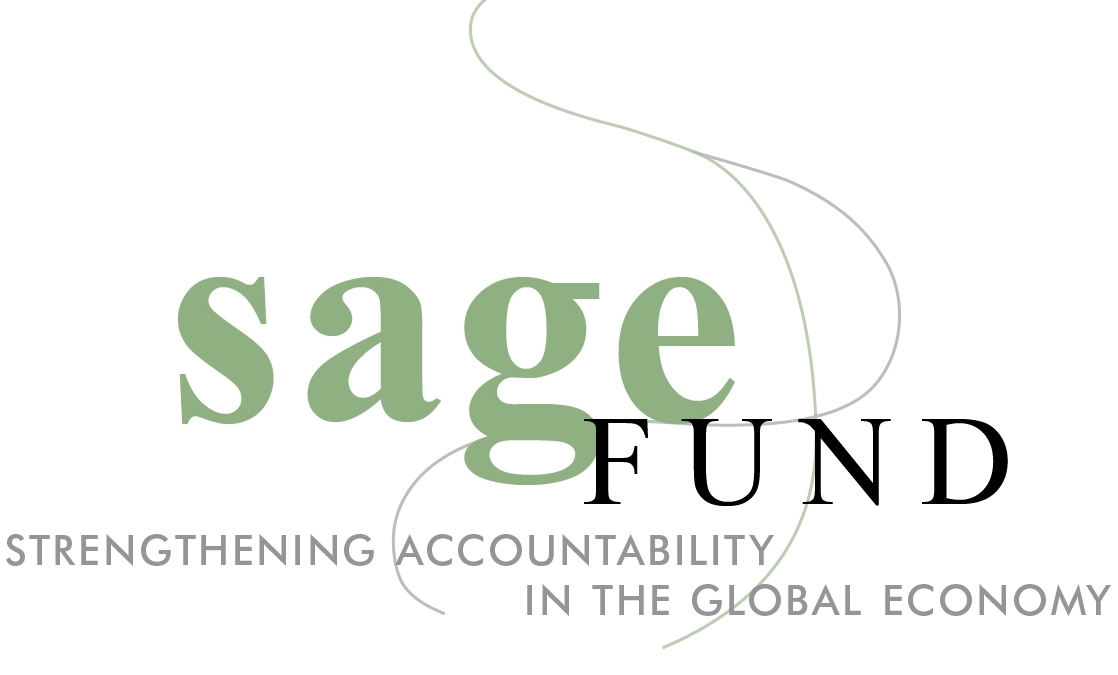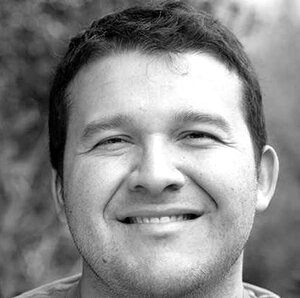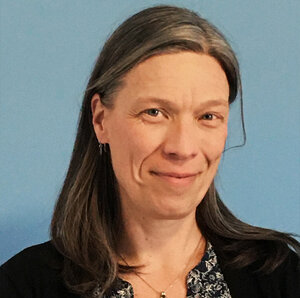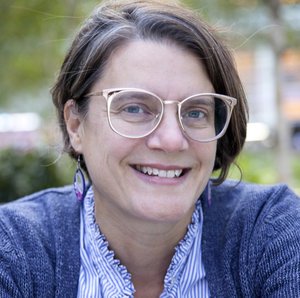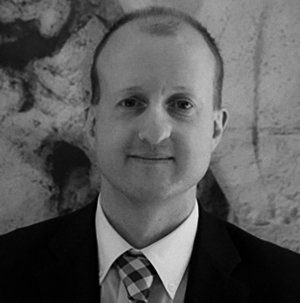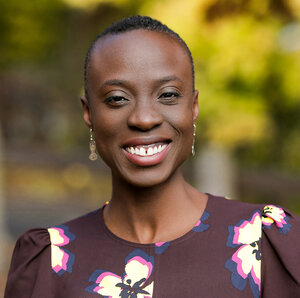Strengthening Accountability in the Global Economy Fund [SAGE Fund]
| URL |
https://Persagen.com/docs/sage_fund.html |
| Sources |
Persagen.com | InfluenceWatch.org | other sources (cited in situ) |
| Source URL |
https://www.influencewatch.org/non-profit/sage-fund/ |
| Date published |
2021-09-02 |
| Curation date |
2021-09-02 |
| Curator |
Dr. Victoria A. Stuart, Ph.D. |
| Modified |
|
| Editorial practice |
Refer here | Dates: yyyy-mm-dd |
| Summary |
The Strengthening Accountability in the Global Economy (SAGE) Fund is a collaborative group for left-of-center foundations. The SAGE Fund - a dark money pass-through conduit - is a project of the New Venture Fund - a 501(c)(3) funding and fiscal sponsorship nonprofit created and managed by the for-profit consultancy Arabella Advisors. |
| Self-reported summary |
The SAGE Fund is a collaborative fund that cultivates breakthroughs in human rights accountability for economic actors - spurring innovation in approaches and building greater field capacity in the human rights movement. The Fund works interactively with groups to pilot new tools and strategies that require more upfront design to increase their likelihood of success. We support multi-tiered partnerships between civil society organizations and affected communities to bring an array of skills, knowledge and leverage points. |
| Related |
|
| Keywords |
Show
- Dark money-related:
- 501(c)(3) nonprofit organization
- advocacy groups
- Christian right
- collaborative
- conservatism
- dark money
- disruptive influencers
- donor-advised funds
- donors collaborative
- lobbying
- nonprofit organizations
- pass-through funder
- secretive advocacy groups
- Ideologies:
- left-of-center
- left-of-center ideology
- left-of-center policies
- left-wing | left-wing politics
- Social advocacy:
- accountability
- active learning
- activism
- Argentine military junta victims
- climate change
- community-led movements
- corporate accountability
- corporate legal accountability
- criminal justice
- criminal justice reform
- cultural rights
- development
- disability justice
- disability rights
- due process
- economic actors
- economic development
- economic justice
- economic rights
- egalitarianism
- emerging opportunities
- environmental defenders
- environmental health
- environmental licensing
- environmental protections
- ethically-sourced food
- evictions
- extra-territorial obligations
- extractive industries
- food justice
- food sovereignty
- fossil fuel divestiture
- G20 advocacy
- gender equality
- global economy
- governance
- grantmaking
- gun control
- hazardous waste management
- healthcare
- human rights
- human rights accountability
- human rights protections
- human rights violations
- human trafficking
- immigrant rights movements
- indigenous peoples
- inequality
- institutional reform
- intergovernmental organizations
- international investment and competition law
- labor rights
- land rights
- mapping study
- maternal health
- migrant rights
- natural resources
- non-governmental organization
- non-state actors
- operational grievance mechanisms
- philanthropy
- political ecology
- post-apartheid democracy
- pre-trial detention
- public charity
- public health
- public interest projects
- racial justice
- Roma (Romani) community evictions (France)
- slavery
- social equality
- social justice
- social rights
- sustainability
- sustainable food systems
- torture
- transitional justice
- victims' reparations
- women's economic justice
- women's rights
- worker-led movements
- workers' rights
|
| Named entities |
Show
- SAGE Fund - staff:
- Katrina Anderson (Women's Rights Advisor)
- Marion Cadier (Program Officer)
- Daria Caliguire (Founding Director, SAGE Fund; former project manager, consultant, Ford Foundation)
- Lien de Brouckere (Advisor)
- Patricia "Tricia" Feeney (Senior Advisor)
- Bela Garces (Program Associate)
- Kris Genovese (Program Officer)
- Karyn Keenan (FORGE Coordinator)
- Carlos Lozano (FORGE Program Officer)
- Maggie Weese (Program Associate)
- SAGE Fund - Advisory board:
- Lesley Carson (Director, International Human Rights Program, Wellspring Philanthropic Fund)
- Greg Mayne (Program Officer, Oak Foundation)
- Conniel Malek (True Costs Initiative)
- SAGE Fund - projects:
- Community Driven Strategies
- Enforcement Strategies
- Investment Mapping Tools
- Remedy for Mining Disasters
- Remedy and OGM (Operational Grievance Mechanisms)
- Women's Economic Justice
- Worker Empowerment Strategies
- Dark money funders:
- Arabella Advisors
- Ford Foundation
- FORGE
- Funders Organized for Rights in the Global Economy (FORGE; Founding Member: True Costs Initiative, Conniel Malek)
- Fundación Avina
- Humanity United
- Joyce Foundation
- Laudes Foundation
- NEO Philanthropy
- New Venture Fund (managed by: Arabella Advisors)
- Oak Foundation
- Omidyar Network (Pierre Omidyar)
- Open Society Foundations
- SAGE Fund (project of: New Venture Fund)
- Strengthening Accountability in the Global Economy Fund (SAGE Fund)
- True Costs Initiative
- Wallace Global Fund
- Wellspring Philanthropic Fund
- Watchdogs:
- Social advocacy groups:
- 11th Hour Project (Schmidt Family Foundation; Lien de Brouckere)
- ABA Rule of Law Initiative (American Bar Association; Lien de Brouckere)
- Above Ground (Canada; Karyn Keenan)
- African Coalition for Corporate Accountability (Global Rights; Lien de Brouckere)
- Amnesty International (Marion Cadier; Patricia Feeney)
- Amnesty International USA (Lesley Carson)
- Ariadne (Greg Mayne, Chair, Advisory Board)
- Beyond Trafficking and Slavery
- Black Mamas Matter Alliance (Katrina Anderson)
- Business and Human Rights Resource Center (Marion Cadier)
- Canadian Network on Corporate Accountability (Karyn Keenan)
- Center for International Environmental Law (Kris Genovese; Board Member, Conniel Malek)
- Center for Reproductive Rights (Katrina Anderson)
- Centre for Research on Multinational Corporations (Amsterdam; Kris Genovese)
- Coalition for Human Rights in Development (Kris Genovese)
- Community Impact Internships Program (Johns Hopkins University, Baltimore, Maryland; Maggie Weese)
- Community Resource Exchange (Kris Genovese)
- CooperAcción (Peru; Karyn Keenan)
- Defenders of Wildlife (International Counsel: Kris Genovese)
- Deutsche Gesellschaft für Internationale Zusammenarbeit (Lien de Brouckere)
- Early Warning System (International Accountability Project; Kris Genovese)
- EDGE Funders Alliance (Board Member, Conniel Malek)
- Environmental Defender Law Center (Board Member, Conniel Malek)
- Environmental Law Alliance Worldwide (Lien de Brouckere)
- ESCR-Net
- Forefront Leaders (Founding Director: Lesley Carson)
- Global Rights (African Coalition for Corporate Accountability; Natural Resources & Human Rights Program)
- Halifax Initiative (Karyn Keenan)
- Human Rights Funders Network (Lesley Carson)
- Human Rights Institute (International Bar Association; Greg Mayne)
- Independence of Judges and Lawyers (United Nations Special Rapporteur; assistant, Greg Mayne)
- International Accountability Project
- International Corporate Accountability Roundtable (Marion Cadier)
- International Federation for Human Rights (Marion Cadier)
- International Human Rights Program (Wellspring Philanthropic Fund; Director: Lesley Carson)
- International Human Rights Programme (Oak Foundation; Programme Officer: Greg Mayne)
- International Network for Economic, Social and Cultural Rights (ESCR-Net; Founding Director: Daria Caliguire)
- Natural Resources & Human Rights Program (Global Rights; Lien de Brouckere)
- Natural Resources and Resilient Women Initiative (Katrina Anderson)
- Oxfam (Patricia Feeney)
- Peace and Social Justice Program (Ford Foundation; first Director: Daria Caliguire)
- People, Land, and Resources Program (Center for International Environmental Law; Director: Kris Genovese)
- Rights and Accountability in Development (Founder: Patricia Feeney)
- Rights and Resources Initiative (Lien de Brouckere: Deputy Director, Africa program)
- Schmidt Family Foundation
- Treaty on Human Rights and Business (International Federation for Human Rights; Marion Cadier)
- Trust Fund to End Violence against Women (United Nations; Katrina Anderson)
- Office of the High Commissioner for Human Rights (United Nations; Patricia Feeney)
- United Nations
- United Nations Guiding Principles on Business & Human Rights (Lien de Brouckere)
- Women's Initiatives for Gender Justice (Katrina Anderson)
- World Bank
- Documents:
- Advancing Human Rights Accountability for Economic Actors: An Introductory Field Guide for Funders (author: Daria Caliguire)
- The Future of Work
- Other mentions:
- COVID-19 pandemic
- Foreign Operations Subcommittee of the Appropriations Committee (United States Senate; Lesley Carson)
- Peru–United States Trade Promotion Agreement (Kris Genovese)
- Patrick Leahy (D-VT; 2021: President pro tempore, United States Senate)
- Rockwood Leadership Institute (Equity in Philanthropy Fellow: Conniel Malek)
- Baltimore, Maryland
- Washington, D.C.
- District of Columbia
- Maryland
- United States
- Africa
- Afghanistan
- Asia
- Brazil
- Burma
- Amsterdam, Netherlands
- Cambodia
- Canada
- Columbia
- Democratic Republic of Congo
- Europe
- France
- Global South
- India
- Latin America
- Netherlands
- Peru
- South America
- South Africa
- South Asia
- Southeast Asia
- Sub-Saharan Africa
- Tanzania
- Thailand
- The Hague, Netherlands
- Zambia
- Zimbabwe
|
| Ontologies |
Show
- Science - Social sciences - Economics - Economic systems - Capitalism - Advocacy - Lobbying - Advocacy groups - Secretive advocacy groups - United States
- Society - Charitable giving & Practices - Politics - Countries - United States - Organizations - Nonprofit organizations - 501(c)(3) organizations - Ford Foundation
- Society - Charitable giving & Practices - Politics - Organizations - Nonprofit Organizations - Dark money
- Society - Charitable giving & Practices - Politics - Organizations - Nonprofit Organizations - Dark money - Countries - United States - Donor-advised funds - Arabella Advisors
- Society - Charitable giving & Practices - Politics - Organizations - Nonprofit Organizations - Dark money - Countries - United States - Donor-advised funds - Joyce Foundation
- Society - Charitable giving & Practices - Politics - Organizations - Nonprofit Organizations - Dark money - Countries - United States - Donor-advised funds - NEO Philanthropy
- Society - Charitable giving & Practices - Politics - Organizations - Nonprofit Organizations - Dark money - Countries - United States - Donor-advised funds - Arabella Advisors - New Venture Fund
- Society - Charitable giving & Practices - Politics - Organizations - Nonprofit Organizations - Dark money - Countries - United States - Donor-advised funds - Oak Foundation
- Society - Charitable giving & Practices - Politics - Organizations - Nonprofit Organizations - Dark money - Countries - United States - Donor-advised funds - Open Society Foundations
- Society - Charitable giving & Practices - Politics - Organizations - Nonprofit Organizations - Dark money - Countries - United States - Donor-advised funds - Wellspring Philanthropic Fund
- Society - Charitable giving & Practices - Politics - Organizations - Nonprofit Organizations - Dark money - Countries - United States - Donor-advised funds - SAGE Fund
|
Introduction
Source for this subsection: InfluenceWatch.org | local copy, 2021-09-08
The Strengthening Accountability in the Global Economy Fund [SAGE Fund] is a collaborative group for left-of-center foundations. The SAGE Fund is a project of the New Venture Fund, a 501(c)(3) funding and fiscal sponsorship nonprofit created and managed by the for-profit consultancy Arabella Advisors. The SAGE Fund was created by the New Venture Fund to national level groups" focused on human rights improvement in less economically developed nations.
Several members of the SAGE Fund's Advisory Board belong to a number of left-of-center grant-making foundations, including the Oak Foundation, and the Wellspring Philanthropic Fund.
Background
Source for this subsection: InfluenceWatch.org | local copy, 2021-09-08
The SAGE Fund was created in January 2015 based on guidelines formulated through a mapping study written by SAGE Fund director Daria Caliguire entitled Advancing Human Rights Accountability for Economic Actors: An Introductory Field Guide for Funders. The study outlines how left-of-center donors and activists can address these problems, involving "greater investment in regulatory and legal strategies" such as establishing extra-territorial obligations which "define human rights obligations for states and intergovernmental organizations." In addition, the study discussed establishing a "consensus and an agenda for the field" to identify where donors and activist groups could make the biggest impact.
In 2017, the SAGE Fund supported a grant towards a project focused on determining regional community consent for mining operations in Central American countries, such as El Salvador and Guatemala. Among the several groups involved in the project included the Association for the Development of El Salvador (CRIPDES), and the Institute for Policy Studies, a Washington D.C.-based think tank that advocates for left-of-center policies.
In 2019, the SAGE Fund partnered with Beyond Trafficking and Slavery, a project of the U.K.-based advocacy group openDemocracy, with support from the Ford Foundation, and the Open Society Foundations, to publish a report, entitled The Future of Work [2018-10-12 archive.org snapshot], which outlined ways to improve the conditions for workers and the changing standards of employment within the global economy. OpenDemocracy has connections to NEO Philanthropy, a U.S.-based pass-through liberal money conduit, despite the group's complaints about supposed American Christian groups' spending on politics in Europe.
Mission
Source for this subsection: SAGE Fund
The SAGE Fund seeks to strengthen human rights accountability of powerful economic actors, and address critical gaps in protection created by the global economy through:
Spurring innovation in the tools and approaches used to hold all economic actors (particularly non-state actors) accountable for human rights violations;
Building knowledge, skills and capacity (with a focus on the Global South) to analyze key challenges, fashion strategies in response and mobilize new coalitions and constituencies; and,
Creating greater leverage within the donor and non-governmental organization (NGO) communities by building consensus and an agenda for the field, and identifying priorities and opportunities for impact.
The SAGE Fund targets support for a layer of work that spurs innovation: seeding new approaches - or creating breakthroughs in existing ones - that lead to greater enforcement of human rights standards and more robust accountability of economic actors.
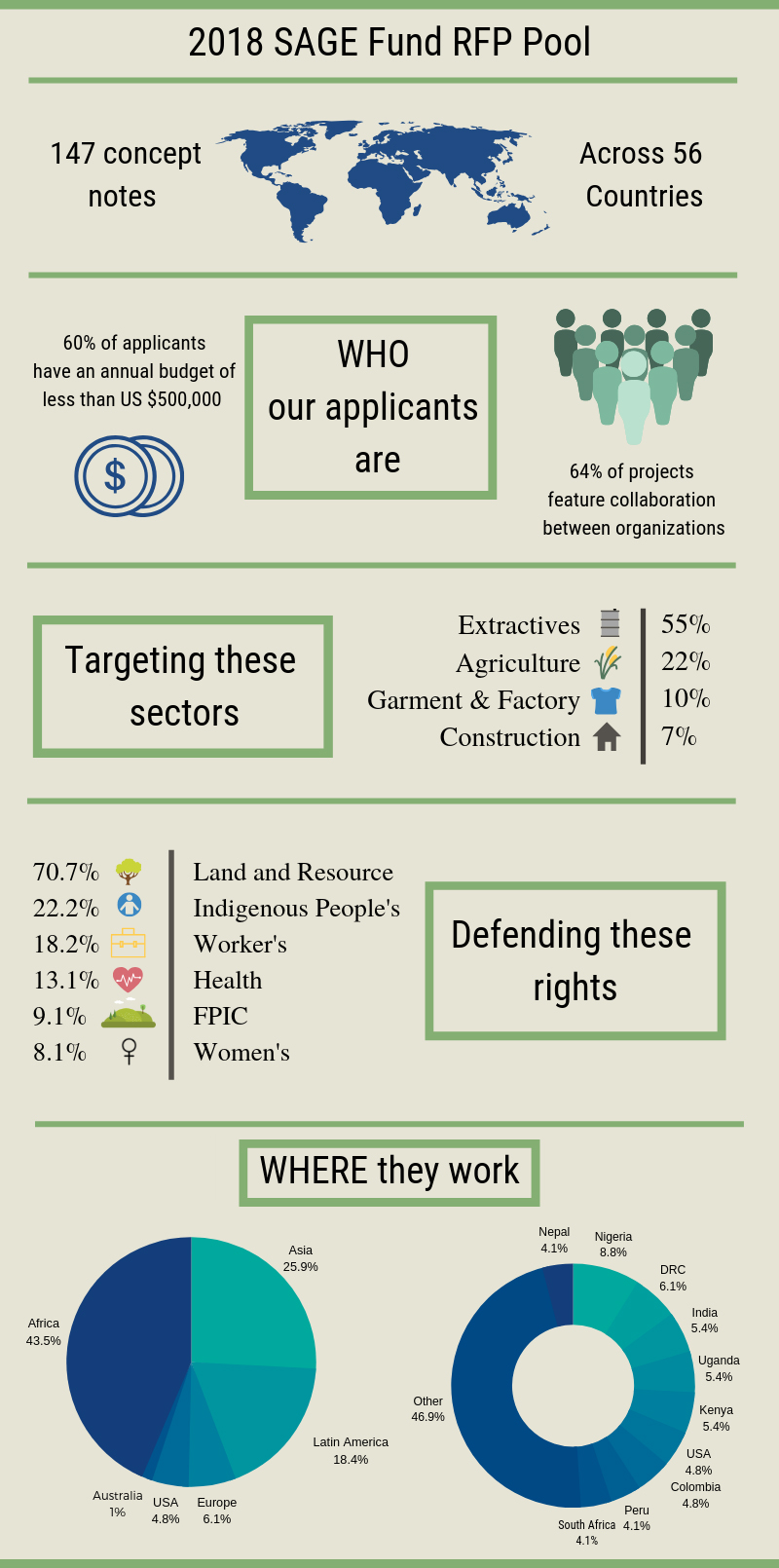 SAGE Fund infographic.
[Source]
SAGE Fund infographic.
[Source]
Funding
Source for this subsection: InfluenceWatch.org | local copy, 2021-09-08
Due to its status as a project of the New Venture Fund, the SAGE Fund is not required to file a separate tax return. However, critics have accused New Venture Fund of being a "dark money outfit," using projects like the SAGE Fund to anonymously funnel money from donors to left-of-center initiatives and organizations.
Staff
Source: SAGE Fund | local copy, 2021-09-02
Daria Caliguire
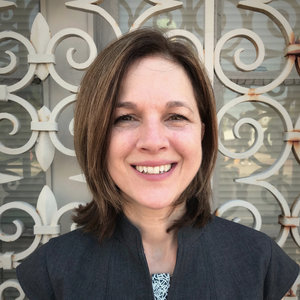
Daria Caliguire, Director, SAGE Fund.
[Source]
Daria Caliguire is the Founding Director of the SAGE Fund. She was responsible for conducting an in-depth mapping study (2015-01), Advancing Human Rights Accountability for Economic Actors: An Introductory Field Guide for Funders [local copy], analyzing challenges and approaches to holding corporations, development finance institutions and non-state actors accountable to human rights obligations. The mapping study laid the groundwork for the design and launch of the SAGE Fund in 2015. Previously, she worked with donors and non-governmental organizations (NGOs) as an advisor on economic, social and cultural rights (ESC Rights) and human rights and global economy issues.
Daria Caliguire has experience developing new strategies, programs and organizations to advance human rights, development and economic justice. Beginning in 2001, Daria worked with a global group of human rights NGOs to create the International Network for Economic, Social and Cultural Rights (ESCR-Net), and became the first director of the network. Previously, she was a Project Manager in the Ford Foundation's Peace and Social Justice Program, developing new initiatives and thematic lines of work across the foundation's offices. Beginning in 1994, she spent four years in South Africa working with local NGOs on governance, environment and economic development issues in the new post-apartheid democracy.
Daria Caliguire holds a Masters in Public Policy from the Harvard Kennedy School of Government, a BA from Kalamazoo College, and studied at the University of Cape Town as a Rotary Scholar.
Kris Genovese
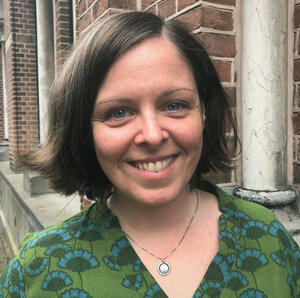
Kris Genovese, Program Officer, SAGE Fund.
[Source]
Kris Genovese joined SAGE Fund in April 2021. In the last several years, Kris was instrumental in developing the Early Warning System [new page], now hosted by the International Accountability Project; the creation of the Coalition for Human Rights in Development; and most recently, the launch of the Community Resource Exchange.
Prior to working at the SAGE Fund, Kris Genovese worked at the Amsterdam-based Centre for Research on Multinational Corporations (SOMO), where she supported communities in accessing the complaints mechanisms associated with development finance institutions. Kris previously worked at the Center for International Environmental Law (CIEL), where she was the Director of the People, Land, and Resources Program. Earlier in her career, she served as International Counsel at Defenders of Wildlife, where she led a campaign to improve environmental protections in the U.S.-Peru Free Trade Agreement [Peru-United States Trade Promotion Agreement].
Kris Genovese holds a law degree from New York University School of Law, and a B.S. in Environmental Policy and Behavior from the University of Michigan School of Natural Resources and the Environment [now: University of Michigan School for Environment and Sustainability?]. Kris is based in Haarlem, The Netherlands.
Marion Cadier
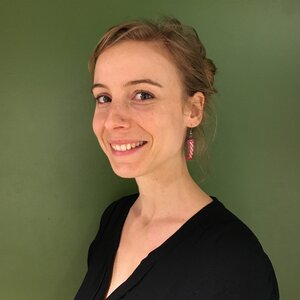
Marion Cadier, Program Officer, SAGE Fund.
[Source]
Marion Cadier joined the SAGE Fund in September 2019. Prior to the SAGE Fund, she worked for several international non-governmental organizations (NGOs) focusing on corporate accountability and human rights protection. With the International Corporate Accountability Roundtable (ICAR), she led work on corporate reporting on modern slavery, mandatory human rights due diligence, and G20 advocacy. Marion also served as Researcher at the Business and Human Rights Resource Center, where she tracked and analyzed the latest developments related to corporate legal accountability. Before that, she worked with the International Federation for Human Rights (FIDH), focusing among other on community-driven documentation and international advocacy including around the Treaty on Human Rights and Business. Marion also worked for Amnesty International's International Secretariat, focusing on forced evictions of Roma communities in France.
Marion Cadier holds a BA from King's College London, and an MA from the School of Oriental and African Studies (SOAS, University of London). She is fluent in Spanish, French and English.
Carlos Lozano
Carlos Lozano is a Colombian human rights and environmental lawyer with extensive experience in Latin America. He has an LL.M. in Environmental and Natural Resources Law from the University of Oregon, United States, which he attended as a Fulbright Scholar. He has worked as a researcher and consultant for Latin American and international non-governmental organizations (NGOs), governmental and cooperation agencies on issues of institutional reform, sustainability and transitional justice. He also has participated on teams providing technical assistance to Colombia's government on environmental licensing, human rights, victims' reparations and hazardous waste management. He has also experience in public interest litigation, and accountability.
Karyn Keenan
Karyn Keenan joined the SAGE Fund in 2021 as the Coordinator of the FORGE collaborative. Prior to joining the SAGE Fund, Karyn was the Founding Director of Above Ground [Canada], an advocacy organization that promotes corporate accountability and access to justice for the victims of corporate abuse. Karyn was active for many years on the steering committee of the Canadian Network on Corporate Accountability (CNCA). Previously, she worked at the Halifax Initiative, a civil society coalition with a focus on international financial institutions. Karyn worked for several years in South America, including at the Peruvian organization, CooperAcción, where she supported communities impacted by the extractive industries [natural resources].
Karyn graduated from Osgoode Hall Law School, and completed her articles at the Canadian Environmental Law Association. She holds a Master in Environmental Studies from York University, and a B.Sc. from McMaster University.
Bela Garces
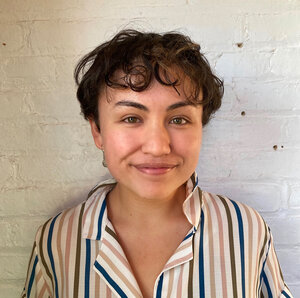
Bela Garces, Program Associate, SAGE Fund.
[Source]
Bela Garces joined the SAGE Fund in the summer of 2020. The prior spring she graduated from Johns Hopkins University with a Bachelor's in Environmental Studies, focusing on sustainable food systems and political ecology. While attending Johns Hopkins University, Bela worked with the university's dining department on the Real Food Challenge, which aimed to increase the availability of local, sustainable, and ethically-sourced food products on campus. She was also on the governing board of Real Food Hopkins, a club that provided peer-learning on food justice and sovereignty, and led campaigns to transform the university's food system.
Maggie Weese

Maggie Weese, Program Associate, SAGE Fund.
[Source]
Maggie Weese joined the SAGE Fund in 2018. Before arriving at the SAGE Fund, she worked as the Program Assistant for the Community Impact Internships Program, an internship program at Johns Hopkins University that pairs college students with Baltimore-based nonprofit organizations and government agencies to work on community-identified projects in Baltimore, Maryland. Maggie graduated from Johns Hopkins University in 2017 with a Bachelor's in Public Health. While at Hopkins, she worked as the lead organizer for the Johns Hopkins University fossil fuel divestment campaign, which successfully pressured the University to divest from thermal coal in 2017. She is currently pursuing a joint Master of Public Health and Urban Planning at Harvard University.
Tricia Feeney
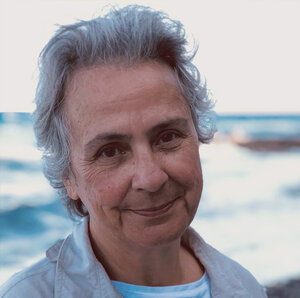
Tricia Feeney, Senior Advisor, SAGE Fund.
[Source]
Patricia "Tricia" Feeney's career has been spent on the front lines of human rights and humanitarian work in Latin America and Africa. During that time, she has had senior roles and extensive field experience with Amnesty International, where she investigated the enforced disappearance of thousands of opponents of the Argentine military juntas, and with Oxfam, where she studied the impact of development projects funded by international financial institutions such as the World Bank. In 1998, Patricia Feeney founded Rights and Accountability in Development (RAID), a trail-blazing research and advocacy organization in the field of business and human rights. While leading RAID as its executive director until 2017, she travelled extensively in Africa - to the Democratic Republic of Congo, Zambia, Zimbabwe and Tanzania - and developed RAID's work, ranging from legal actions against mining companies complicit in war crimes to pressing stock markets for more effective regulation of companies involved in corruption and human rights abuses. Patricia read modern languages at London University [University of London], and has worked as a consultant for the UN Office of the High Commissioner for Human Rights, and advised the United Kingdom Government on corporate governance.
Katrina Anderson
Katrina Anderson, Women's Rights Advisor, SAGE Fund
Katrina Anderson is a human rights advocate working to advance gender justice [gender equality] in partnership with feminist and social justice movements around the world. She supports social justice leaders, organizations, and philanthropic institutions to refine their strategies, innovate to meet new challenges, and build resilient organizations. She is trained as an international human rights lawyer who has worked in the U.S., Europe, South Asia and Southeast Asia for a range of local, national and global organizations.
Prior to starting her consulting practice in 2017, Katrina Anderson was Senior Human Rights Counsel for eight years at the Center for Reproductive Rights. There she partnered with racial justice, disability justice and immigrant rights movements to design and implement advocacy initiatives, including co-founding the Black Mamas Matter Alliance, to address severe racial disparities in U.S. maternal health. Before that she worked as a program officer for United Nations Trust Fund to End Violence against Women, and as Legal Officer for the Women's Initiatives for Gender Justice, in The Hague. She has also lived and worked in Cambodia and began her human rights work on the Thai-Burma border addressing human rights and environmental harms facing women migrant agricultural workers.
Katrina Anderson has a B.A. from the University of Virginia, a J.D. from Seattle University School of Law, and an LL.M. in international human rights law from American University's Washington College of Law.
Since 2019 Katrina Anderson has worked with the SAGE Fund to bring a gender analysis to its grantmaking, first by helping to launch a pilot round of grants to strengthen women's economic justice, and currently as coordinator for the Natural Resources and Resilient Women Initiative [local copy], a two-year initiative that aims to amplify the resilience strategies of women's human rights and environmental defenders.
Lien de Brouckere
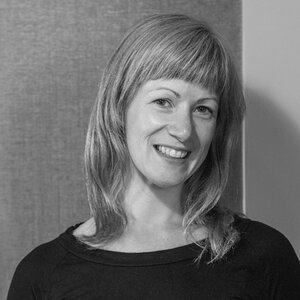
Lien de Brouckere, Advisor, SAGE Fund.
[Source]
Lien de Brouckere is a U.S.-qualified lawyer advising on strategies and providing technical support to assert and defend land and human rights, advance corporate accountability, and rights-based development in the context of major development projects. Her experience includes working in more than a dozen countries in Sub-Saharan Africa as well as Afghanistan. In her freelance work she has advised, among others, the 11th Hour Project of the Schmidt Family Foundation, the Environmental Law Alliance Worldwide (ELAW), the Deutsche Gesellschaft für Internationale Zusammenarbeit (GIZ) GmbH, and the American Bar Association's ABA Rule of Law Initiative (ABA ROLI).
Lien de Brouckere previously served as the Deputy Director of the Africa program at the Rights and Resources Initiative, advancing recognition of indigenous peoples' and local community land rights. Before that, she directed the Natural Resources & Human Rights Program at Global Rights, where she led the launch of the African Coalition for Corporate Accountability (ACCA), with members representing more than 25 countries. She has collaborated with the mandate team of the United Nations Guiding Principles on Business & Human Rights, to further access to non-judicial remedy, and practiced international investment and competition law in New York and Europe with a global law firm for a number of years.
Lien de Brouckere completed her law degree with Great Distinction from McGill University and speaks French, Dutch, English, and German fluently.
Advisory Board
Lesley Carson
Lesley Carson directs the International Human Rights Program at the Wellspring Philanthropic Fund, where she has worked since 2007. She specializes in work on disability rights, human rights in the global economy, and transitional justice. With over 20 years of experience in international public service, Lesley has field experience in Africa, Asia, Latin America, and Europe, as well as policy and grant making experience in the United States. She has served as Co-Chair of the Human Rights Funders Network, a global philanthropic network of more than 600 member foundations.
Prior to the Wellspring Philanthropic Fund, Lesley Carson served as Founding Director of Forefront [Forefront Leaders; local copy], an advocacy, training, and protection network of frontline human rights defenders from around the world. She has worked for Amnesty International USA, served on the Foreign Operations Subcommittee of the Appropriations Committee with Senator Patrick Leahy (D-VT; 2021: President pro tempore of the United States Senate), and taught a course on the role of civil society in human rights at New York University.
Lesley Carson has a Masters of International Affairs from , and a B.A. from Harvard University.
Greg Mayne
Greg Mayne is a Programme Officer for the International Human Rights Programme, Oak Foundation [InfluenceWatch.org, via 2021-06-20 archive.org snapshot | deleted, 2008, 2014">local copy]. Greg Mayne leads the International Human Rights Programme's grant making on criminal justice reform, with a focus upon issues of due process, pre-trial detention and torture, primarily in Brazil and India. He is also responsible for the International Human Rights Programme's grant making on business and human rights, specifically corporate accountability and increasing access to justice, as well as its overall grant making in India. Greg is also Chair of the Advisory Board of Ariadne, the network of European funders for social change and human rights.
Greg Mayne has more than 20 years' experience in a range of countries in Africa, Asia and Latin America on upholding human rights and the rule of law, with an emphasis on ensuring respect for human rights in criminal justice systems. He formerly assisted the United Nations Special Rapporteur on the Independence of Judges and Lawyers, and also worked at the Human Rights Institute of the International Bar Association focusing on the capacity-building of bar associations in Southern Africa.
Greg Mayne holds degrees in Business from Australian Catholic University, and Law from the University of New South Wales. He also holds an LL.M. in International Law from the School of Oriental and African Studies (SOAS, University of London).
Conniel Malek
Conniel Malek is the Executive Director of True Costs Initiative, which seeks to increase corporate accountability and strengthen legal systems in the Global South. Her work centers on driving collaboration among communities, funders, and creative leaders in an effort to tip the balance so corporations are held accountable for and internalize the true environmental and human costs of their actions. She is a proud daughter of the Caribbean and is particularly committed to advocating for the rights of those in often overlooked parts of the globe as it pertains to climate justice and technical expertise. In addition, Conniel is a Board Member of the Center for International Environmental Law (CIEL), the Environmental Defender Law Center (EDLC), and EDGE Funders Alliance. Under her leadership, the True Costs Initiative became one of the founding members of Funders Organized for Rights in the Global Economy (FORGE).
Conniel Malek was an Equity in Philanthropy Fellow with the Rockwood Leadership Institute, and prior to the True Costs Initiative, practiced corporate law for a decade. She is a graduate of the University of Virginia School of Law, and received her B.A. in Government and International Relations from Cornell University.
Projects
Source: SAGE Fund
Worker Empowerment Strategies. Improving local labor conditions while building workers' long-term capacity to advance labor rights protection, accountability, and environmental sustainability.
Women's Economic Justice. Preventing or remedying the disproportionate negative impacts of economic globalization on women, through women-led and designed strategies.
Remedy for Mining Disasters. Laying the groundwork to hold mining companies accountable for rehabilitation and remedy in mining disasters.
Enforcement Strategies. Designing robust strategies to break through barriers to enforcement in key corporate accountability decisions.
Community Driven Strategies. Seeding new strategies to strengthen community control and corporate accountability in investment.
Remedy and OGM. Ensuring access to remedy for affected communities in the design and use of Operational Grievance Mechanisms (OGMs).
Investment Mapping Tools. Piloting new tools for mapping investment and strengthening accountability across supply chains.
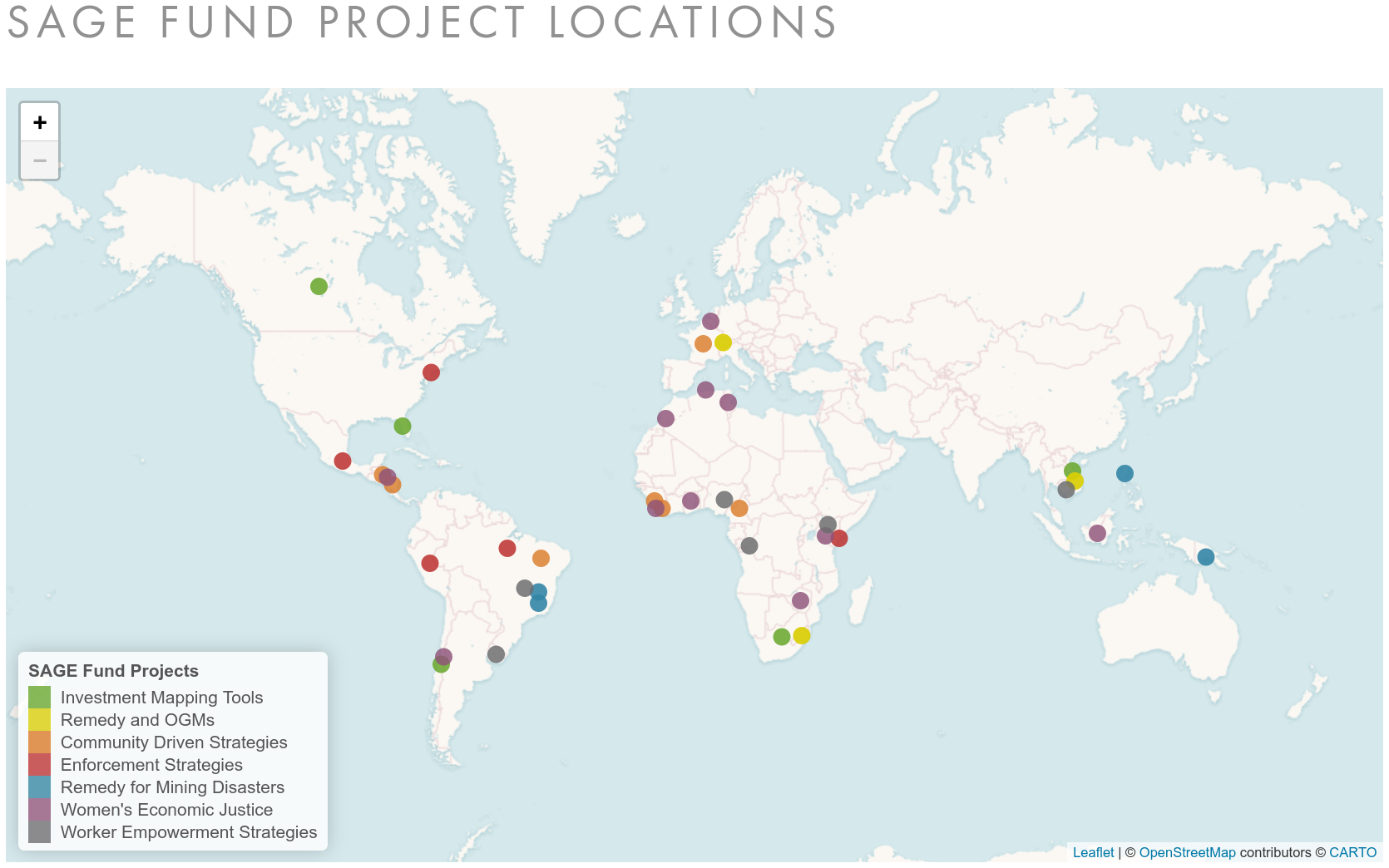 SAGE Fund project locations.
SAGE Fund project locations.
[Source]
FORGE (Funders Organized for Rights in the Global Economy)
Source for this subsection: SAGE Fund
FORGE (Funders Organized for Rights in the Global Economy) is a collaborative of philanthropic donors, working together towards a global economy that works for all people and the planet, shaped by and accountable to worker-led and community-led movements. The SAGE Fund is proud to be a part of FORGE, both as a strategic thought partner and a vehicle for grantmaking.
FORGE provides a collaborative, a dynamic space for learning, aligning, and pooled funding strategies for a just economy. FORGE is designed to cultivate innovation, flexibility, and forward-movement. FORGE's strength lies in the breadth of issues its funders are focused on - including natural resources and climate change, labor rights, migrant rights, women's rights, human rights, and corporate accountability - enabling exploration of how these issues intersect with one another.
FORGE funders collaborate and amplify their impact by:
Participating in an active learning agenda;
Aligning funding around field-building efforts; and
Pooling funds to harness and scale emerging opportunities.
Response and Vision Fund
Our global economic system is ready to be reinvented. The COVID-19 pandemic and deepening economic recession have further exposed the urgency of addressing inequality and the climate crisis. To correct the structural misalignments between short-term profit on the one hand and people and the planet on the other - we need bold, innovative action. In recognition of this, Ford Foundation, Fundación Avina, Humanity United, Laudes Foundation, Pierre Omidyar [Omidyar Network], Open Society Foundations, SAGE Fund, True Costs Initiative, Wellspring Philanthropic Fund, and Wallace Global Fund have joined forces to launch the Response and Vision Fund [FORGE].
The Response and Vision Fund will support promising strategies which achieve impact now, and provide the opportunity to translate lessons to scale. Fundación Avina will lead the response grantmaking, supporting community-led and civil society organizations, workers' rights groups and social movements that work with those most impacted by the economic fallout of COVID-19. The SAGE Fund will lead the fund's longer-term vision grantmaking to advance systems-change approaches to shifting the economy in a more just and sustainable direction.
Additional Reading
[CapitalResearch.org, 2019-09-09] The SAGE Fund: A Black Box Funder | local copy
Return to Persagen.com
